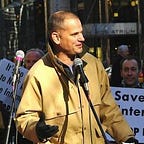PBS must have really crossed the line this time.
During its broadcast of Trump’s post-indictment rally on June 13, PBS NewsHour added factual context to the disgraced former president’s claims that he had won the 2020 election, that federal prosecutor Jack Smith was a “deranged lunatic” and a “thug,” and that the so-called deep state was “destroying our country” and “coming after you next.”
NewsHour set the record straight via text chyrons at the bottom of the screen. For example, when Trump falsely claimed that he had won the 2020 election, NewsHour layered on a chyron stating factually: “There is no evidence of widespread voter fraud during the 2020 election.”
How dare PBS.
But what really set off Trump loyalists was the NewsHour chyron that appeared near the end of the former president’s speech. As he pledged to use all his might to fight the deep state, NewsHour added a chyron stating: “Experts warn that inflammatory rhetoric from elected officials or people in power can prompt individual actors to commit acts of violence.”
This triggered far-right influencers like Charlie Kirk (2.3 million Twitter followers) and Jack Posobiec (2.1 million Twitter followers), who took to social media to call for a total defunding of PBS.
By the following morning, “Defund PBS” was trending on Twitter and across other social-media platforms. The public-media network’s crime? Telling the truth.
Starving public media
But in their rush to discredit PBS, Kirk, Posobiec and their influencer ilk omitted some important details about U.S. public media. They forgot to mention that overwhelming majorities of people in the United States (81 percent) believe federal funding for PBS is taxpayer “money well spent,” according to a recent poll.
Americans also say they trust PBS twice as much as commercial broadcast TV, three times more than newspapers and five times more than cable channels.
Had these Trump supporters actually bothered to scrutinize the idea that the U.S. is overfunding public-media outlets, they would have found the opposite: U.S. government spending per capita on public media falls far below amounts offered by other advanced democracies. At $465 million, the U.S. FY 2022 allocation boils down to little more than $1.40 per person in the country.
By comparison, the United Kingdom spends $81 per person and France more than $75 per capita to support public media. Head further north and the numbers head north as well: Denmark spends more than $93 a person, while Finland spends more than $100 and Norway more than $110. And it isn’t just a European trend: Japan (+$53/capita) and South Korea (+$14) show their appreciation for publicly funded media at levels that put the U.S. outlay to shame.
“Despite being the wealthiest nation on the planet, the United States impoverishes its public media infrastructures,” writes Professor Victor Pickard, co-director of the Media, Inequality and Change Center at the University of Pennsylvania (and Free Press’ board chair).
And by impoverishing public media, the U.S. is also impoverishing democratic society.
A recent comparative study by Pickard and Professor Timothy Neff found that more robust public-media funding deepened public knowledge about civic affairs and provided more diverse news coverage in a given country. After analyzing funding levels in 33 nations in Africa, Asia, Europe, Latin America, the Middle East, North America and South America, they concluded that “high levels of secure funding for public media systems and strong structural protections for the political and economic independence of those systems are consistently and positively correlated with healthy democracies.”
What ‘influencers’ don’t want you to know
And perhaps that’s what right-wing provocateurs don’t want you to know: Larger investments in public media help build the types of societies that are more resilient to authoritarian demagogues and the rampant spread of hate and disinformation.
In other words, what we really need to do is increase federal funding because such public support benefits democratic society as a whole.
Free Press has made increasing funds for public-interest media a central part of its mission since our founding more than 20 years ago. Not only have we fought efforts to defund NPR and PBS, we’ve also helped implement new ways to support local, independent and noncommercial media. This includes funding public structures to support the production of local and diverse news and information, and the sort of investigative reporting that holds abusive leaders accountable.
Our work in New Jersey and California has resulted in state-level solutions that prioritize outlets doing this important work. We are also calling for a tax on online advertising that would support an endowment for local-accountability journalism that would fund news-reporting efforts in communities that need them the most.
So the next time a cabal of far-right influencers shouts “Defund PBS” across social media, consider that these views aren’t broadly shared — and that such attacks are to be expected from followers of a disgraced and twice-indicted former president who believes a free press is the “enemy of the American people.”
When PBS added chyrons during Trump’s inflammatory speech, it was providing viewers with the fact that such rhetoric can lead to bloodshed. The Jan. 6 insurrection is just one prominent example of how the toxic lies of powerful people can fuel real-world violence. But it wasn’t the first example, and it won’t be the last.
What Kirk, Posobiec and their cronies are really afraid of is a public-media system that acts as a bulwark against such extremism, one that holds powerful people — like Trump — accountable for the lies they tell and the political violence that they knowingly incite.
